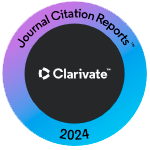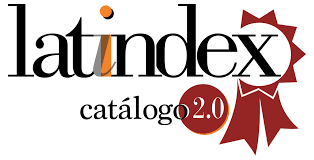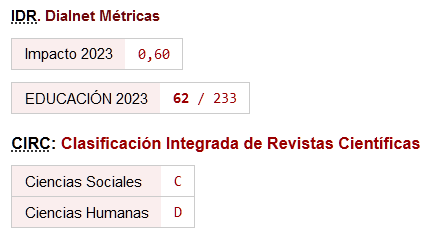La formación virtual en tiempos de COVID-19. ¿Qué hemos aprendido?
DOI:
https://doi.org/10.46661/ijeri.6361Palabras clave:
COVID-19, educación, competencia digital, brecha digital, Tecnología EducativaResumen
La crisis provocada por el COVID-19 ha tenido un gran impacto en la sociedad en general y sistemas educativos en particular. En este contexto, numerosos estudios llevados a cabo antes y durante la pandemia ponen de manifiesto la importancia de las tecnologías como principales herramientas garantes de los procesos de enseñanza y aprendizaje a distancia. Sin embargo, todavía existen numerosas brechas a superar para que dichos procesos sean efectivos al 100%. Por ello, en este estudio se trata de presentar un juicio fundamentado y crítico de las principales variables que han afectado al éxito o fracaso de las prácticas educativas virtuales. En este sentido, se realiza una revisión de las últimas investigaciones e informes educativos antes y durante la pandemia. Fruto de ello, se presentan los resultados en tres grandes bloques: cuestiones iniciales a tener en cuenta, brechas digitales y aportaciones para el futuro. Se concluye haciendo un resumen de los principales factores facilitadores del e-learning (política, profesorado, alumnado, familia…) y se delibera sobre la necesidad formativa de todos los colectivos implicados.
Descargas
Citas
Aditya, D.S. (2021). Embarking digital learning due to COVID-19: Are teachers ready? Journal of Technology and Science Education, 11(1), 104-116. https://doi.org/10.3926/jotse.1109
Aloizou, V., Chasiotou, T., Retalis, S., Daviotis, T., y Koulouvaris, P. (2021). Remote learning for children with Special Education Needs in the era of COVID-19: Beyond tele-conferencing sessions. Educational Media International, 1-21. https://doi.org/10.1080/09523987.2021.1930477
Álvarez-Álvarez, C. y García-Prieto, F. (2021). Brecha digital y nuevas formas académicas en la escuela rural española durante el confinamiento. Educar, 57(2), 397-411. https://doi.org/10.5565/rev/educar.1250
Avendaño-Castro, W. R., Hernández-Suárez , C., y Prada-Núñez, R. (2021). El docente universitario ante la emergencia educativa. Adaptación a las TIC en los procesos de enseñanza. Educación Y Humanismo, 23(41).
https://doi.org/10.17081/eduhum.23.41.4354
Banco Interamericano de Desarrollo (2020). La educación superior en tiempos de COVID-19. Aportes de la Segunda Reunión del diálogo Virtual con Rectores e Universidades Líderes de América Latina. Banco Interamericano de Desarrollo.
Bas, M. (2021). La educación superior en Iberoamérica en tiempos de pandemia Impacto y respuestas docente. Fundación Carolina.
Beardsley, M., Albó, L. Aragón, y P. Hernández-Leo, D. (2021). Emergency education effects on teacher abilities and motivation to use digital technologies. British Journal of Educational Technology, 52, 1455–1477. https://doi.org/10.1111/bjet.13101
Bubb, S., y Jones, M. A. (2020). Learning from the COVID-19 home-schooling experience: Listening to pupils, parents/carers and teachers. Improving schools, 23(3), 209-222. https://doi.org/10.1177%2F1365480220958797
Burgos, C., Vázquez-Cano, E., López-Meneses, E. y Adaos, R. (2020). DIFPRORET PROJET: Analysis of educational difficulties, proposals and challenges facing the COVID-19. IJERI: International Journal of Educational Research and Innovation, 15, 17-34. https://doi.org/10.46661/ijeri.5145
Cano, S., Collazos, C., Flórez-Aristizabal, l., Moreira, F. y Ramírez, M. (2020). Experiencia del aprendizaje de la Educación Superior ante los cambios a nivel mundial a causa del Covid-19. Campus Virtuales, 9(2), 51-59.
Carrillo, C., y Flores, M. A. (2020). COVID-19 and teacher education: A literature review of online teaching and learning practices. European Journal of Teacher Education, 43(4), 466-487. https://doi.org/10.1080/02619768.2020.1821184
Casal-Otero, L., Barreira-Cerqueiras, E. M., Mariño-Fernández, R., y García-Antelo, B. (2021). Competencia Digital Docente del profesorado de FP de Galicia. Pixel-Bit. Revista De Medios y Educación, 61, 165-196. https://doi.org/10.12795/pixelbit.87192
Casimiro, W., Casimiro, C, Barbachán, E. y Casimiro, J. (2020). Stress, Anguish, Anxiety and Resilience of University Teachers in the Face of Covid-19. Utopía y praxis Latinoamericana, 25(7), 453-464.
CEPAL-UNESCO (2021). La educación en tiempos de la pandemia de COVID19.UNESCO
Çimen, B. y Hangül, S. (2021). Digital Immigrant Teachers’ Perceptions about Digital. European Journal of Education and Psychology, 14(2), 1-21.
Darling-Hammond, L., y Hyler, M. E. (2020). Preparing educators for the time of COVID… and beyond. European Journal of Teacher Education, 43(4), 457-465. https://doi.org/10.1080/02619768.2020.1816961
Ellis, V., Steadman, S. y Mao, Q. (2020). Come to a screeching halt’: Can change in teacher education during the COVID-19 pandemic be seen as innovation? European Journal of Teacher Education, 559-572.
https://doi.org/10.1080/02619768.2020.1821186
Engzell, P., Freya, A., y Verhagen, M. (2021). Learning loss due to school closures during the COVID-19 pandemic. PNAS, 118(17). https://doi.org/10.1073/pnas.2022376118
Ewing, L. y Cooper, H. (2021). Technology-enabled remote learning during Covid-19: perspectives of Australian teachers, students and parents. Technology, Pedagogy and Education, 30(1), 41-57. https://doi.org/10.1080/1475939X.2020.1868562
Garrison, D.R. y Anderson, T. (2005). El e-learning en el siglo XXI. Octaedro.
Garzón-Artacho, E., Sola-Martínez, T., Trujillo-Torres, J. M., y Rodríguez-García, A. M. (2021). Competencia digital docente en educación de adultos: un estudio en un contexto español. Pixel-Bit. Revista De Medios y Educación, 62, 209-234. https://doi.org/10.12795/pixelbit.89510
Gil-Fernández, R., León-Gómez, A., y Calderón, D. (2021). Influence of COVID on the educational use of Social Media by students of Teaching Degrees. Education in the Knowledge Society,, 22. https://doi.org/10.14201/eks.23623
Inciarte González, A., Paredes-Chacín, A. J., y Zambrano Villada, L. M. (2020). Docencia y tecnologías en tiempos de pandemia covid-19 / Teaching and technologies in times of covid-19 pandemic. Utopía y Praxis Latinoamericana, 25(1), 195-215.
Iniciarte, A., Paredes-Chacín, A. y Zambrano, L. (2020). Docencia y tecnologías en tiempos de pandemia covid-19. Utopía y praxis Latinoamericana, 25(8), 195-215.
Kai, K.Y., y Tan, K.H. (2020). ESL Teachers’ Intention in Adopting Online Educational Technologies during COVID-19 Pandemic. Journal of Education and E-Learning Research, 7(4), 387-394. https://doi.org/10.20448/journal.509.2020.74.387.394
Kidd, W., y Murray, J. (2020). The Covid-19 pandemic and its effects on teacher education in England: how teacher educators moved practicum learning online. European Journal of Teacher Education, 542-558. https://doi.org/10.1080/02619768.2020.1820480
Kuhfeld, M. Y., Soland, J. y Tarasawa, B. (2020). Projecting the Potential Impact of COVID-19 School Closures on Academic Achievement. Educational Researcher, 49(8), 549–565. https://doi.org/10.3102%2F0013189X20965918
López-Noguero, F., García-Lázaro, I., y Gallardo-López, J. A. (2021). Consecuencias del COVID-19 en los centros educativos en función de su contexto socioeconómico y titularidad. https://doi.org/10.30827/publicaciones.v51i3.16709
Maile, R., Mena, J. y Feinauer, E. (2020). Faculty readiness for online crisis teaching: transitioning to online teaching during the COVID-19 pandemic. European Journal of Teacher Education, 523-541. https://doi.org/10.1080/02619768.2020.1815702
Mancera, C., Serna, L. y Barrios, M. (2020). Pandemia: maestros, tecnología y desigualdad. Nexos.
Morocho, M. (2021). El Aseguramiento de la Calidad de la Educación Superior en Latinoamérica y el Caribe en tiempos del COVID-19: Visión de las Instituciones de Educación Superior. CALED-Ecuador y UTPL-Ecuador.
Navarro-Espinosa, J. A., Vaquero-Abellán, M., Perea-Moreno, A.-J., Pedrós-Pérez, G., Aparicio-Martínez, P., y Martínez-Jiménez, M. P. (2021). The Higher Education Sustainability before and during the COVID-19 Pandemic: A Spanish and Ecuadorian Case. Sustainability, 13(11), 6363. http://dx.doi.org/10.3390/su13116363
OCDE (2019). Docentes en Iberoamérica: Análisis de PISA y TALIS. OCDE
Onyema, E. (2020). Impact of Coronavirus Pandemic on Education. Journal of Education and Practice, 11(13), 108-121.
Parmigiani, D., Benigno, V., Giusto, M., Silvaggio, C. y Sperandio, S. (2021). E-inclusion: online special education in Italy during the Covid-19 pandemic. Technology. Pedagogy and Education, 30(1), 111-124. https://doi.org/10.1080/1475939X.2020.1856714
Pedró, F. (2021). COVID-19 y educación superior en América Latina y el Caribe: efectos, impactos y recomendaciones políticas. Análisis Carolina, 36(1), 1-15.
Ramírez-Montoya, M. S. (2020). Transformación digital e innovación educativa en Latinoamérica en el marco del CoVId-19. Campus virtuales, 9(2), 123-139.
Reimers, F., y Schleicher, A. (2020). A framework to guide an education response to the COVID-19 Pandemic of 2020. OECD.
Ryan, T. (2021). Designing video feedback to support the socioemotional aspects of online learning. Educational Technology Research and Development, 69, 137–140 https://doi.org/10.1007/s11423-020-09918-7
Sainz, J., Sanz; I. y Capilla, A. (2020). Efectos en la Educación Iberoamericana:un año después de la COVID-19. OEI
Schleicher, A. (2020). The impact of covid-19 on education insights from education at a glance 2020. OECD
Scully, D., Lehane, P. y Scully, C. (2021). It is no longer scary’: digital learning before and during the Covid-19 pandemic in Irish secondary schools. Technology, Pedagogy and Education, 30(1), 159-181.
https://doi.org/10.1080/1475939X.2020.1854844
Sixto-García, J., Y Duarte-Melo, A. (2020). Self-destructive content in university teaching: new challenge in the Digital Competence of Educators. Communication & Society, 33(3), 187-199. https://doi.org/10.15581/003.33.3.187-199
Trujillo Sáez, F. (2021). The school year 2020-2021 in Spain during the pandemic . Joint Research Centre. http://dx.doi.org/10.2760/729245
Turpo-Gebera, O., Hurtado-Mazeyra, A., Delgado-Sarmiento, Y., y Peréz-Postigo, G. (2021). Satisfacción del profesorado con la formación en servicio online: aproximaciones desde la usabilidad pedagógica. Pixel-Bit. Revista De Medios y Educación, 62, 39-70. https://doi.org/10.12795/pixelbit.79472
VanLeeuwen, C. A., Veletsianos, G., Johnson, N., y Belikov, O. (2021). Never‐ending repetitiveness, sadness, loss, and “juggling with a blindfold on:” Lived experiences of Canadian college and university faculty members during the COVID‐19 pandemic. British Journal of Educational Technology. https://doi.org/10.1111/bjet.13065
Yates, A., Starkey, L., Egerton, B., y Flueggen, F. (2021). High school students’ experience of online learning during Covid-19: the influence of technology and pedagogy. Technology, Pedagogy and Education, 30(1), 59-73. https://doi.org/10.1080/1475939X.2020.1854337
Descargas
Publicado
Cómo citar
Número
Sección
Licencia
Derechos de autor 2022 Julio Cabero-Almenara, Rubicelia Valencia-Ortiz, Antonio Palacios-Rodríguez

Esta obra está bajo una licencia internacional Creative Commons Atribución-NoComercial-SinDerivadas 4.0.











